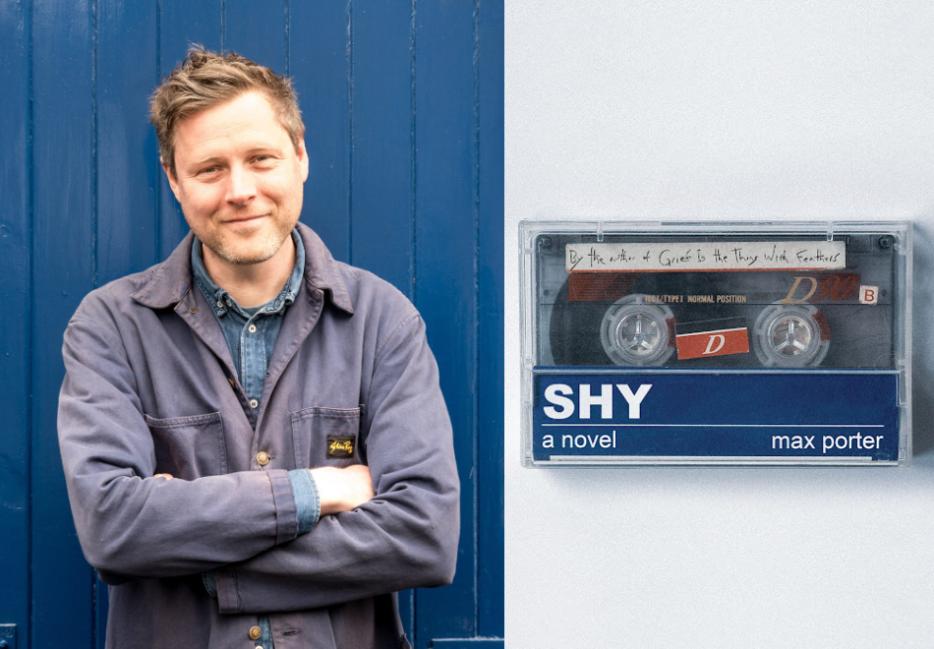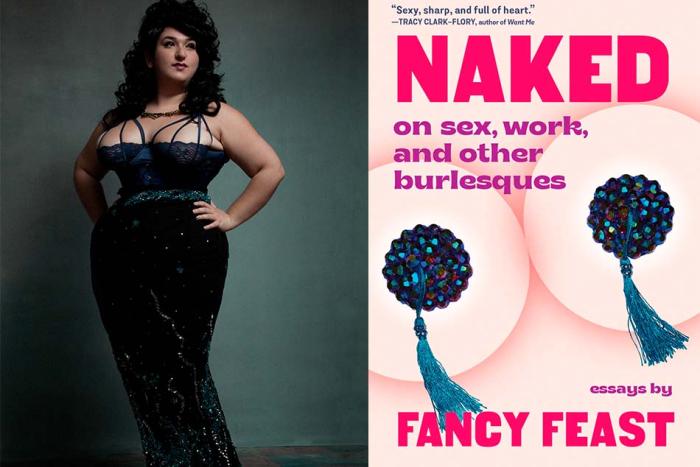There is a line in the Louis MacNeice poem “Snow” that aptly expresses how it feels to read a novel by Max Porter: “I peel and portion / A tangerine and spit the pips and feel / The drunkenness of things being various.” Porter’s latest polyphonic novel, Shy (Strange Light), has this drunken variousness in spades—from its drumbeat momentum to its haunted inner (and outer) discourses. Shy resonates with Porter’s compassionate, curious outlook in all its abundance.
Author of Grief Is the Thing with Feathers (currently being made into a feature film starring Benedict Cumberbatch), Lanny, and The Death of Francis Bacon, Porter is a maker and collector of deceptively small treasures. There are his books, but also, as we discussed two years ago, his collection of vintage doll furniture. Shy offers another world in miniature, inscribed with the voices that come from and surround the title character—a troubled boy of thirteen who finds himself at the end of the end. In a scant 122 pages, Porter surges through Shy’s anguished childhood and adolescence, situating us within the walls of Last Chance, an English boarding school for impossible boys. Enclosed within the echoing words of his family, teachers, caregivers, and schoolmates, Shy cooks in his pain, accompanied by the pulse of his beloved drum-and-bass music. His dark night of the soul stretches the length of time it takes to read it.
This description does not credit Shy’s humour and kindness, of which there is plenty.
Porter and I met in a small room at Penguin Random House Canada’s Toronto offices a few hours before he was to give a high-performance reading of Shy at Massey Hall, accompanied by Leslie Feist. In the odd formality of the office, we talked about mushrooms—edible, medicinal, psychedelic—and about getting roasted by teenagers before easing into the heart of this slight but screaming novel.
~
Naomi Skwarna: Shy seems to come from what I imagine is a sort of inchoate, or maybe internal place. You’ve said previously that the idea came from conversations that you were having with your man friends… your male friends? Your gentlemen friends.
Max Porter: Sounds like I’m meeting men in public spaces.
You said you were going for walks with men though, right?
(With great seriousness) “You were meeting men in toilets in central Bristol.”
Okay, let me reframe this—you were going on walks with your buddies, who are men, having conversations about reconciling the artist with the facts of their life, yes? You mentioned how your feelings about Ted Hughes changed after reading the diaries of Sylvia Plath, and the challenge of squaring your love for someone’s writing with the more personal knowledge of their deeds.
It’s funny that you bring the Hughes in. Reconciling the work with the person, in a time of artificially stoked culture war, it is ever more important that we do that work for ourselves based on our own moral compass, right? Outside of any trends or fashions that would suggest a person should be read or not read, I think it becomes all the more important to ask: “What am I looking for in the work? How obedient do I need to be to the moral architecture of our time?” For a lot of people that becomes a public thing, and I think as a reader, one of the things you have to savour for yourself is the privacy of the encounter. And then there’s the sense of yourself as an ever-changing entity. Someone I thought was morally repellent fifteen years ago I might find interesting now, or vice versa.
That’s the point I got to with Ted [Hughes], briefly after reading those letters. I couldn’t stomach it for a little while. But then of course, I’m denying myself the pleasures of one of the greatest handlers of the English language that has ever lived.
How did that discomfort express itself?
One of the ways that I think it’s translated in me is a particular attention to the raising of [my] children. Something I find interesting about the way men talk about their children is the sense that you’re supposed to think about care in ways that are inherited from mainstream culture. When you get talking to people, you realize how insecure we are in those categories, and how rewarding it is to just dig a tiny bit deeper into them.
So did Shy come from that bit of conversational digging, with other men, other fathers?
[With Shy], the idea of this unhappy teenage boy seemed like a live problem to me. I wouldn’t write an illustrated book about unhappy teenagers based on case studies or conversations with unhappy teenage boys, but the whole landscape of my life as a people watcher was hugely relevant. Shy [the character] is strongly based on my mum, and conversations we’ve had about her youth and the grief that she experienced when she was young. My grandmother, whose memory I cherish, and whose character is very present in Shy’s sort of voluble switching between states. Also, a lot of the mentoring I do, like one of the autistic people I work with. They all brought to bear on Shy and this problem of mapping a person like him.
It must be difficult to know when and where to stop mapping.
As a novelist, it’s really, really beautiful to realize that the editorial process is never done—that you can never find a linguistic formulation for a thing and not want to carry on interrogating it. The idea that this child is suicidal, as a proposition, was just wonderful to write around and realize the extent to which that’s someone else’s idea he’s carried. It’s an idea that’s landed in his head, that is simultaneously a deep, deep impulse, but also a performance designed to impress or concern other people that care for him. We’re all doing that, and I love the extent to which we’re all doing that.
It sounds like you really discovered a lot within that pressurized time period [of the pandemic].
What I found the pandemic enabled was an actual analysis of that [topic] in conversation with other people. Normal life hadn’t afforded me that. It’s a bit like shining a light, and I think very carefully as a writer about what I’m shining my light on. If you shine it on the obvious thing, or the pre-existing formulation of a thing, it doesn’t yield anything new. But if you change the attention—I pay the language a certain type of attention, like a poet would—like, just playing with your representative strategies in order to yield that little bit extra. With Shy, it came from realizing that I needed to be totally absent. There is no novelist’s voice essaying on why Shy is so unhappy. There was, but with the help of a good editorial insight from an early reader, I realized how bad it was. It sucked all the energy out of Shy as a living proposition and made him just the object of the novelist’s gaze.
The fundamental challenge and joy of writing Shy is that he doesn’t have the language for himself. For him, it’s just noise or agony. How do you write that? And even more, how would you write that beautifully? Could that be beautiful? Something that is so full of ugliness and self-defeat?
How did you orient yourself in the writing, and what not to write, once you’d set that intention?
With this book, I think I’m trying to get at the judgmental way in which we describe people who want to take their own life, and try to flood it more with a shared acceptance of that. Writing it was extraordinarily cathartic. I wrote it from a place of anger at the present political climate and a desire to sort of tunnel into myself and others, see what I could hear. There was no resolution, I didn’t have a moral imperative with this book, I wanted to listen. So I built it like a sort of listening machine.
And then at various points I was really surprised by what they told me. For example, the boys as they wrote themselves, that kind of lateral, communal dynamic in the school: that was hugely surprising to me, like how even in their abuse, they were actually being really, really good to one another. I think of them as quite a progressive bunch of people, even though they’re hammering each other with homophobic and body-based abuse every single day. In terms of the discussions they’re having, under the umbrella of that care, they’re actually really making progress about trauma and recovery and gender and race—and class, particularly, as a huge thing in the UK.
I wanted them to be proto-sociological in the ways they’re hurting one another. And also, a sort of eroticism. What emerged and surprised me while I was writing was that in the language of bullying, there is a kind of erotic charge going on that is hugely interesting.
Yeah. That intensely physical, like, grabbing of bodies. Even when it’s violent, it can be really intimate, smelling someone that you’re getting so close to. Scalp and sebum, all those teenage boy smells.
Yeah, that’s a lot of scalp and armpit. And spunk, you know, this sense of them in their individual rooms, leading these lives. They’re not alone in the room, they’ve got all their pain in the room with them, they’ve got their families, and they’ve got ghosts in the room, and they’ve got what they’ve done, they’ve got their criminal activity in there, defining them and sort of stewing on them.
You really embodied them so clearly. I don’t think I remember much about how I thought or behaved as a teenager. Shy and the other boys feel really present in their youth; it felt like being that age again.
What I remember is the heat, the busyness of it. The constant agony as a kind of player. That drama you’re in is so relentlessly intense. When I went into my [mentoring] sessions with an idea that I might have some cool way of saying to them, “there’s no difference between a text message and a Wordsworth poem, dudes,” and that wasn’t how it was at all. They were immediately quite rude to me, just totally fixated on their phones and when they could get some food and some fizzy drinks. But then once I’d armed them with the fizzy drinks, I left all my education and intent at the door and decided to listen to what they were actually into. By the end of it, we were just drawing manga cartoons together.
The boys in Shy are guarded, but also so candid. Like when the MP comes to visit them at the school. They don’t want his energy, and they show him that they don’t!
They’re not his demographic! They are unreachable. No think tank, no advisor in his ear, no scripts he’s ever had will give him access to these people. The only tool he has to access them is the one thing he doesn’t have, which is basic humanity, and they sniff him out the minute he walks in the room. He’s a fake. And I love that. I love how young people have this cynicism and open-heartedness that are weaponized together as a beautiful life skill. I think that one of the things that Shy’s about deeply in its heart is that when we lose that, we lose something really important. As [Shy] points out about his stepdad, when we get to the kind of lobotomized, conforming behaviours of adulthood—mortgages, owning a car, comparing ourselves to the neighbours playing golf, cleaning—I mean, he’s cruel about his stepdad, but there’s a point there, right? He’s like, “Is that the future?” I think that’s important, particularly from a political point of view, that yelp, you know? That roaring dissatisfaction with the status quo is incredibly useful.
I was reading Rebecca Solnit’s new book, and she’s sort of talking about how the danger of hope as an almost defeatist, empty vehicle. Sort of like, “Don’t worry, kids, have hope,” you know, that Boomer generation “Sorry, we burned the world, you guys’ll sort it out!” messaging. But she says something like “reformulate hope as the thing with which you break down the door.” I think that chimes with the smashing of the building [in Shy]. Not wishing to sanitize the rage.
For the angry young person or angry young man specifically, who doesn’t kill himself, who graduates, who gets a job, who becomes a stable member of society—where does that anger go? Do we all just get better at suppressing it or sublimating it? And then how does that play out in our functional society, which as you’ve said, is not very functional at all?
One of the depressing answers to that question would be that it becomes what is apparent and doesn’t seem to be going anywhere: a global epidemic of violence against women, or against the self, or the caged animal. It becomes the ways in which we hurt one another, full stop. One of my hopes for someone like Shy—I mean, take my brother, for example, who Shy is not based on, even if he’s present in the mix of things that I thought about. My brother was very unhappy as a teenager, very unhappy. Now he’s a really well-rounded, compassionate, wise person. If I knew [someone like] Shy, I might say, “Go and have a walk with my brother. He’ll talk to you about how he was.” But there will be a futility in that as well, because what I’d be doing then is borrowing the model of the vertical axis, whereby we take the previously hurt and think that they have some insight into the currently hurt. It’s not true. The currently hurt are like, “I don’t need your definition of hurt, this is my own hurt. Don’t try and cure me.” That’s the point, right? Don’t try and diagnose or cure or use a model that was relevant to you to be relevant to me. In fact, now my brother is pretty judgmental about young people taking drugs!
I always find that so interesting—the adults who were really wild and really, really angry, and then they get over it and they can be quite harsh towards others who are still like that.
Like ex-smokers who become really puritanical. Smoking Nazis.
And I get it! You have to make that stuff your enemy in order to stay away from it.
But they aren’t talking about it. They haven’t liberated themselves by shutting that door in their own mind. That’s why I am broadly in favour of breaking bread, like I’m broadly in favour of any kind of project—be it on the local or international level—that gets us to sit down and talk to one another. One of the people who I walk dogs with, a man, he read Shy, and it just opened the door in him about a friend he lost. He was like, “That door had been completely shut. I hadn’t thought about that person, the ways in which we failed him, the ways in which we didn’t fail him and did everything we could, the ways in which we’ve memorialized him or not, the ways in which we put him in a box of people that didn’t make it. And in many ways, he did make it and is the best of us now, like, you know what I mean?”
I think that’s one of the reasons why I believe in the novel as a radical form, because it is doing a form of storytelling that is in fact crucially important for the self. To think about the way others think, and to be aware of the way you think, and the way your consciousness is or isn’t related to other people, is a profoundly important part of the broader work. If the book is a sort of manifesto for anything, it’s for realizing the extent to which you are, in delivering your own monologue, not alone. You are parroting other people, you are borrowing from other people, you’re absorbing other people. You are in the system, you’re in the weather of other people’s consideration of you all the time. That is the self as well, as much as anything innate or centred. I think that’s something we would want our politicians to consider, right? You know, anyone that builds their sense of self or identity around the idea of them and another needs to think much more carefully about the ways in which they are the other. That’s why I did these overlaps in the book, where you don’t know who’s talking. I want you as a reader to think, “Is that a teacher, is that Shy himself? Is it a ghost?” because these are the things I think we should be asking ourselves.






